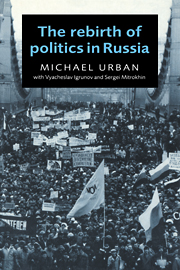Book contents
- Frontmatter
- Contents
- Preface
- Part I The pre-political context
- Part II Perestroika and the return of political life
- 3 Perestroika: renewal, transition or transformation?
- 4 Glasnost, mass media and the emergence of political society
- 5 The informal movement: politics on the margins of the soviet order
- 6 National elections and mass politics
- Part III Politics and revolution
- Part IV Ground up: politics in post-communist Russia
- Notes
- Index
6 - National elections and mass politics
Published online by Cambridge University Press: 22 October 2009
- Frontmatter
- Contents
- Preface
- Part I The pre-political context
- Part II Perestroika and the return of political life
- 3 Perestroika: renewal, transition or transformation?
- 4 Glasnost, mass media and the emergence of political society
- 5 The informal movement: politics on the margins of the soviet order
- 6 National elections and mass politics
- Part III Politics and revolution
- Part IV Ground up: politics in post-communist Russia
- Notes
- Index
Summary
Consummated by an increasingly radical press and informal political movement, midwifed by the political reforms of perestroika, Russian politics was reborn in the national elections of 1989. The birthplace itself spanned myriad sites: voters' assemblies at factories or meeting halls, often raucous, occasionally violent and sometimes lasting till the wee hours of the morning; cramped apartments where candidates huddled with their staffs and volunteers discussing tactics, composing leaflets, arguing philosophy; city streets and public squares where contestants for office engaged the public directly, holding rallies, answering questions, distributing campaign literature. By the time the electoral process had run its course, the circle of political activism had expanded enormously, fanning out from cloisters of informal groups and enclaves of democratic orientation ensconced in official organizations to include millions of citizens who, for the first time in their lives, would have the opportunity to vote. Yet, for three related reasons, it would be mistaken to regard that voting as commensurate with an actual election. First, irrespective of the results of the balloting, there was no possibility whatsoever that the Communist Party could be removed from power. Its ‘leading role’ was still enshrined in the Soviet Constitution, while the legislature which was to be filled by successful candidates had not been designed either to choose or to control a government. The CPSU's political monopoly would remain intact; this election could neither turn it out of office nor serve as a mandate for the continuation of its rule.
Second, there was no organized challenge to its monopoly on power. Outside of the small Democratic Union (which, moreover, boycotted these elections), no other political party existed.
- Type
- Chapter
- Information
- The Rebirth of Politics in Russia , pp. 119 - 144Publisher: Cambridge University PressPrint publication year: 1997



